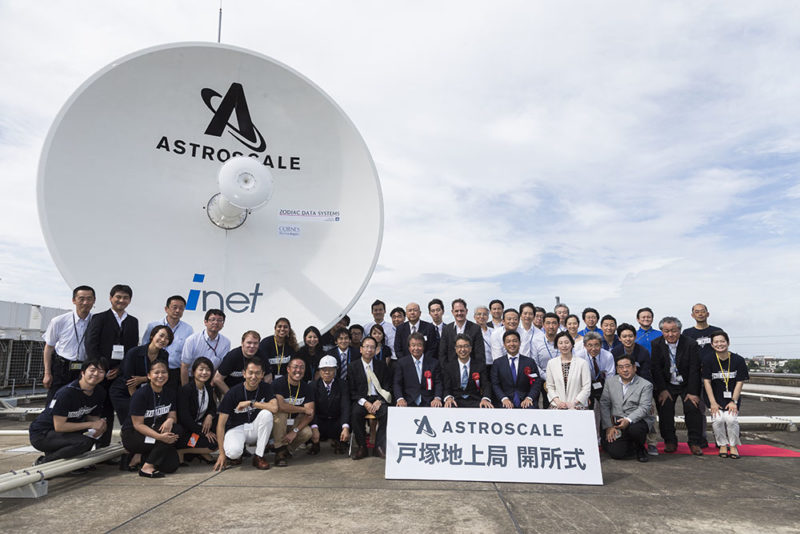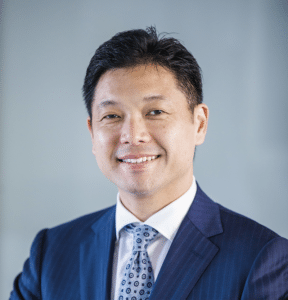Tackling Constellation Debris with Japan’s Astroscale

The Astroscale team. Photo: Astroscale
Despite skepticism from space industry analysts, Japanese entrepreneur Nobu Okada was certain that the emergence of satellite constellations would push operators to invest in orbital debris removal solutions. This motivated him to launch spacecraft retrieval service provider Astroscale in 2013, in hopes of it becoming a reliable and cost-efficient solution for satellite operators around the world.
Via Satellite spoke with Astroscale Founder and Chief Executive Officer Nobu Okada just after the company established its first Japanese ground station in support of its first space debris removal demonstration satellite, ELSA-d, which is scheduled to launch in late 2019. Okada discussed what drove him to enter the space debris business and explained Astroscale’s unique approach to creating orbital sustainability in the age of the “mega constellation.”
VIA SATELLITE: What inspired the launch of Astroscale?

Nobu Okada. Photo: Astroscale
Okada: The concern over the potentially devastating impact of space debris on active satellites has been recognized for many years. However, I found the issue to be a problem of immense technological and regulatory complexity, making it difficult to find funding for a solution. Experts believed there was no market for a private company to address the issue and were looking to the United Nations and regulatory bodies to devise a solution to the problem. I knew there had to be a way for the commercial sector to take the lead through advanced technologies and commercially competitive prices, which would create a new market.
VIA SATELLITE: What made you believe that the experts were wrong and that there was a need in the market for a commercially developed space debris solution?
Okada: Experts were at least talking about space debris, which is the first step toward solving the issue. They were discussing developing the technology, securing the funding, or changing the regulations — when in fact, the space community had long been waiting for a leader to address all of these aspects concurrently. I believe that Astroscale is fulfilling this need. We are not only devising the technology for space debris removal, but also developing a business and serving as a thought leader and contributor to the discussions of policy makers and regulators.
VIA SATELLITE: What makes Astroscale’s technology unique among your peers?
Okada: Since Astroscale is the first entrant in the commercial space debris removal market, most of our approaches are unique in that we are helping to define the possible. Our technologies, supply chain management, alliances, ideas for low-cost solutions (e.g., a semi-cooperative approach), business models, and regulatory solutions are all offerings which we have worked hard to develop and are distinctive in the market. Probably the most unique aspect is the team — an international mix of technical, business, and policy experts with deep experience in the issues related to space debris. The mission of Astroscale is quite simple: to secure long-term spaceflight safety. Our global team has gathered around this common purpose.
VIA SATELLITE: What do you feel are Astroscale’s most important accomplishments since the launch of the company?
Okada: If accomplishment means completion of our mission, then we haven’t accomplished anything yet in concrete terms. We are on the way, though. We look forward to a successful demonstration of our technology in 2019 through the platform ELSA-d. We are confident that this mission will successfully demonstrate our technology and prove our capabilities to address the problem.
For now though, Astroscale’s most important accomplishment is that we have opened the door for the world to consider the viability of a market for debris removal. When I started the company five years ago, nobody was talking about a business solution to the problem and very few people held much hope that this could be successful. I believe that Astroscale has helped increase the public awareness of this issue worldwide and has made it possible for other entrants to join the market, which will lead more quickly to a solution.
VIA SATELLITE: What excites you most about Astroscale’s future?
Okada: We see increasing demand for a sustainable space environment throughout the world. We see governments and the private sector are becoming more responsible and paying more attention to the sustainable use of space. We see more and more that the general public is aware of the space debris issue. We feel we are doing the right thing for humanity at the right time. We feel a responsibility to accomplish our mission.